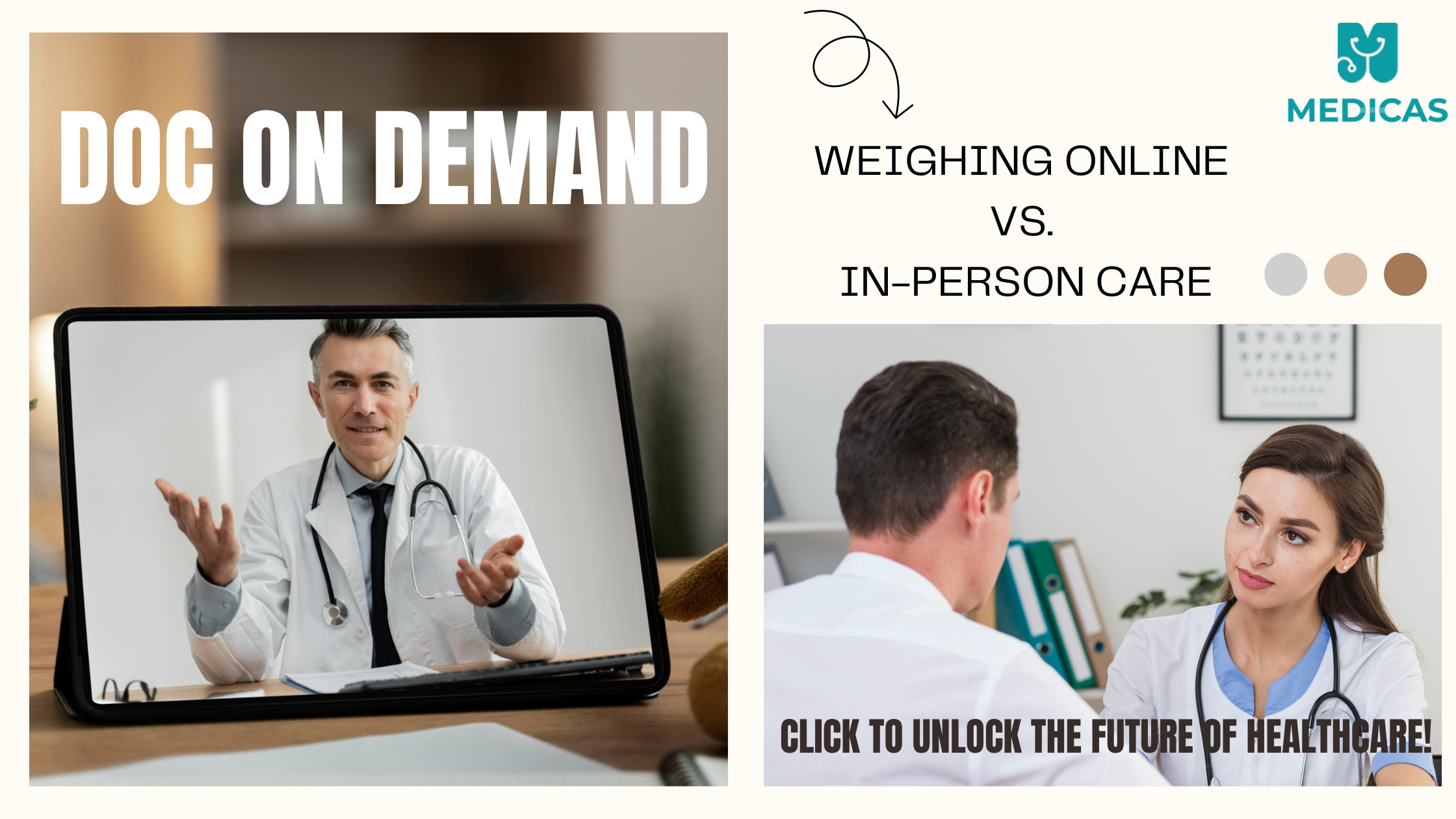The healthcare landscape is evolving rapidly with advancements in technology, providing patients with more options for receiving care. Online Doctor Consultations, also known as telemedicine or telehealth, have emerged as a popular alternative to traditional in-person visits. Understanding the differences between these two approaches is crucial for making informed decisions about your health. This article explores the key aspects, benefits, and challenges of both online doctor consultation and traditional healthcare, highlighting their unique strengths.
What is an Online Doctor Consultation?
Online doctor consultation involves providing healthcare services remotely via digital platforms. Patients can connect with healthcare providers through video calls, phone calls, or messaging apps. This method enables real-time communication and remote diagnosis, making healthcare more accessible, especially for those who might face barriers to in-person visits.
What is Traditional Healthcare?
Traditional healthcare refers to face-to-face visits to medical facilities such as clinics, hospitals, or doctors’ offices. It involves direct interactions between patients and healthcare providers, allowing for physical examinations and diagnostic tests to be conducted on-site.
Online Doctor Consultation vs. Traditional Healthcare
1. Accessibility and Convenience
- Online Doctor Consultation: One of the most significant advantages of online doctor consultation is its convenience. Patients can schedule appointments from the comfort of their homes, eliminating the need for travel. This is particularly beneficial for those living in remote areas or with mobility issues. Additionally, online doctor consultations often have shorter waiting times and flexible scheduling options, including after-hours and weekend availability.
- Traditional Healthcare: Traditional healthcare requires patients to visit a healthcare facility, which can sometimes be time-consuming due to travel and wait times. However, it offers the benefit of immediate access to a range of diagnostic tools and treatments that require physical presence. The personal touch of in-person visits can also be reassuring and foster a stronger connection between patients and providers.
2. Scope of Services
- Online Doctor Consultation: Online doctor consultations are suitable for a wide range of non-emergency conditions, such as follow-up visits, mental health counseling, minor infections, and chronic disease management. However, they are limited in providing hands-on care, such as physical examinations, surgical procedures, and certain diagnostic tests that require direct patient contact.
- Traditional Healthcare: Traditional healthcare encompasses the full spectrum of medical services, including emergency care, surgeries, physical therapy, and comprehensive diagnostic testing. The ability to perform physical examinations and immediate interventions makes it indispensable for complex and acute medical conditions.
3. Quality of Care
- Online Doctor Consultation: The quality of care in online doctor consultation depends largely on the technology used and the communication skills of the healthcare provider. With high-quality video and audio, providers can conduct thorough assessments and offer effective treatments. However, the lack of physical examination can sometimes limit the accuracy of diagnoses.
- Traditional Healthcare: Traditional healthcare allows for a more comprehensive assessment through physical examinations, immediate diagnostic tests, and direct interactions. This often results in a more accurate diagnosis and personalized treatment plan. The availability of a full range of diagnostic tools on-site enhances the ability to address complex health issues promptly.
4. Cost
- Online Doctor Consultation: Online doctor consultation can be more cost-effective due to lower overhead costs. Patients save on travel expenses and may find that telehealth services are affordable.
- Traditional Healthcare: Traditional healthcare can be more expensive due to the costs associated with maintaining a physical facility, staff, and equipment.
5. Patient-Provider Relationship
- Online Doctor Consultation: Building a strong patient-provider relationship through online doctor consultation can be challenging due to the lack of physical presence. However, continuity of care can still be maintained, and some patients may feel more comfortable discussing sensitive issues remotely. The convenience of accessing care from home can also lead to more frequent and consistent interactions with healthcare providers.
- Traditional Healthcare: Face-to-face interactions in traditional healthcare settings foster stronger patient-provider relationships. The ability to observe non-verbal cues and perform physical examinations contributes to a deeper understanding of the patient’s condition and concerns. This personal interaction can build trust and a sense of comfort in the patient.
6. Technology and Connectivity
- Online Doctor Consultation: Successful online doctor consultation depends heavily on reliable internet connectivity and technology. Poor connections can disrupt communication, affecting the quality of care. Additionally, not all patients have access to or are comfortable using digital devices. However, for those with reliable internet and the necessary tech skills, telemedicine can be a highly effective way to receive care.
- Traditional Healthcare: Traditional healthcare does not rely on internet connectivity, making it more accessible to patients without digital literacy or access to technology. The use of advanced medical equipment in facilities ensures comprehensive care. Additionally, traditional settings are equipped to handle a wide range of medical issues, from minor to critical.
7. Privacy and Security
- Online Doctor Consultation: Online doctor consultation must adhere to strict privacy and security regulations to protect patient information. While reputable telehealth platforms use encryption and secure servers, there is always a risk of data breaches. Patients need to ensure they use secure platforms and follow best practices for online security.
- Traditional Healthcare: Traditional healthcare settings also adhere to stringent privacy laws, such as HIPAA. Physical records and in-person interactions can feel more secure to some patients, though electronic health records are increasingly used.
8. Emergency Situations
- Online Doctor Consultation: Online doctor consultations are not suitable for emergencies. Conditions requiring immediate medical attention, such as heart attacks, strokes, or severe injuries, necessitate a visit to an emergency room or urgent care facility. Telehealth can, however, offer preliminary advice on whether an in-person visit is necessary.
- Traditional Healthcare: Traditional healthcare is equipped to handle emergencies with the necessary medical personnel, equipment, and infrastructure. Immediate, hands-on care can be lifesaving in critical situations. Emergency rooms and urgent care centers are designed to provide rapid and comprehensive responses to acute medical issues.
Combining Both Approaches
For many patients, the best approach might be a combination of both online doctor consultations and traditional healthcare. This hybrid model can provide the convenience and accessibility of telehealth for routine care and the comprehensive, hands-on treatment available in traditional settings.
1. Chronic Disease Management
Patients with chronic conditions can benefit from regular online check-ins with their healthcare providers, supplemented by periodic in-person visits for thorough examinations and testing. This approach ensures ongoing management while reducing the need for frequent travel.
2. Mental Health Services
Telehealth has proven highly effective for mental health services, offering accessibility and reducing the stigma associated with visiting a mental health clinic. However, traditional in-person therapy might be necessary for severe cases, providing a safe space for those needing intensive support.
3. Post-Surgical Follow-Up
Post-operative patients can use online doctor consultations for follow-up visits, reducing the need to travel while recovering. Any complications or concerns can then be addressed with in-person visits as needed. This blended approach helps ensure recovery is monitored while providing comfort and convenience.
Conclusion
Both online doctor consultation and traditional healthcare have unique strengths and are valuable in different contexts. Online doctor consultations offer unparalleled convenience, cost savings, and accessibility, making them ideal for non-emergency, routine care, and mental health services. Traditional healthcare, with its comprehensive range of services and hands-on care, remains indispensable for complex diagnoses, emergencies, and procedures requiring physical intervention.
Patients should consider their specific healthcare needs, personal preferences, and the nature of their medical conditions when choosing between online doctor consultations and traditional healthcare. Ultimately, a balanced approach that leverages the strengths of both can provide the most effective and efficient care. Combining online and traditional methods can enhance accessibility, improve patient outcomes, and ensure comprehensive care tailored to individual needs.
Other Healthcare Blogs:
Best Practices for Online Doctor Consultation Platforms in 2024
Healthcare at Your Fingertips: The Advantages of Instant Online Doctor Consultation Services
Navigating Women’s Health Concerns: How Online Consultation Can Help
Debunking Myths About Online Doctor Consultations
Disclaimer:
Medical Advice: The information provided in this blog post is for educational purposes only and should not be considered as a substitute for professional medical advice, diagnosis, or treatment. Always consult with a qualified healthcare professional for personalized guidance regarding your specific medical condition.
Accuracy of Information: While we strive to provide accurate and up-to-date information, the field of medicine and viral fevers is constantly evolving. The content in this blog post may not reflect the most current research or medical guidelines. Therefore, it is advisable to cross-check any information provided with reliable sources or consult a healthcare professional.
Individual Variations: The symptoms, causes, treatment options, and preventive measures discussed in this blog post are general in nature and may not apply to everyone. It is important to remember that each individual’s situation is unique, and personalized medical advice should be sought when making healthcare decisions.
External Links: This blog post may contain links to external websites or resources for additional information. However, we do not endorse or have control over the content of these third-party websites. Accessing these links is done at your own risk, and we are not responsible for any consequences or damages that may arise from visiting these external sources.
Results May Vary: The effectiveness of treatment options or preventive measures mentioned in this blog post may vary from person to person. What works for one individual may not work the same way for another. It is essential to consult with a healthcare professional for personalized advice tailored to your specific needs.



